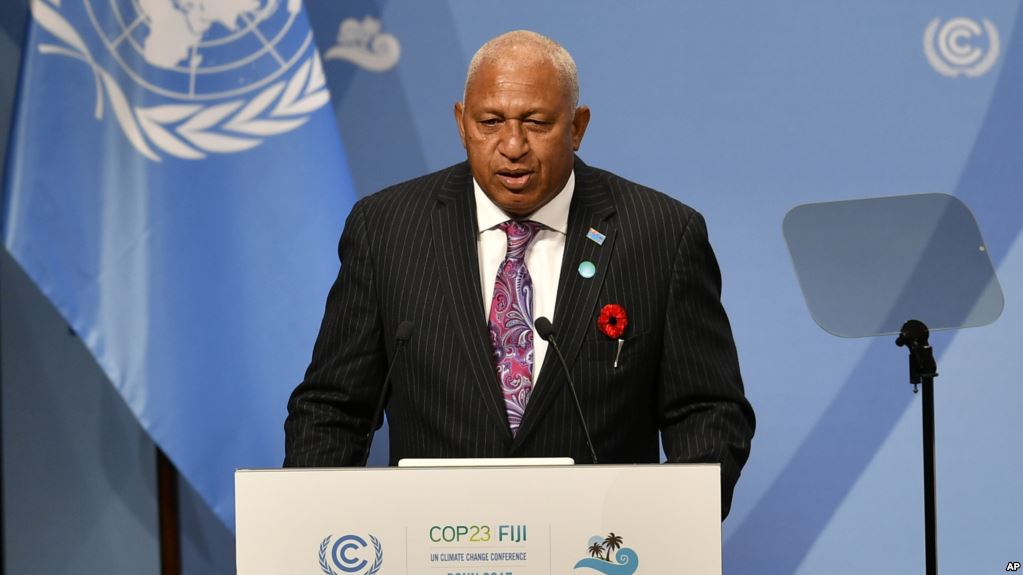
BONN, Germany (PAMACC News) – Fiji’s Prime Minister and incoming COP President, Frank Bainimarama has called for an all inclusive approach in the implementation of the Paris Agreement.
In his opening address that outlined Fiji’s vision for COP23 November 6, 2017 Fiji President called for an all inclusive blue print that focuses on maintaining the momentum for the implementation of the 2015 Paris Agreement on climate change, emphasizing on the need to accelerates climate action for all vulnerable societies like Fiji’ a Small Island Developing State in the Pacific and Africa that are suffering most from the effects of climate change.
“To build greater resilience for all vulnerable nations to the impacts of climate change, including extreme weather events and rising sea level, we need an all inclusive approach,” said the Prime Minister, also President for COP23.
He acknowledged the important leadership roles of past COP Presidencies in laying the foundation for a robust COP23, noting that it was time for the different stakeholders to work in synergy for the success of Fiji’s new vision for COP23 and the implementation of the Paris Agreement.
“Addressing the urgent and immediate needs of the most vulnerable countries must continues to be the priority for all stakeholders,” he appealed.
There is urgent need to build international efforts towards strengthening the resilience of developing countries to climate change, channeling support mainly through avenues like the Least Developed Countries and the Special Climate Fund, Frank Bainimarama noted.
His position was corroborated by the chair of the African group of negotiators Seyni Nafo who emphasized on the need for least developed countries to get the much needed support to stand the climate challenge. He called on African leaders to make informed choices that reflects the needs of the people and grassroots communities that suffers most the impact of climate change.
“African leaders have the obligation to make informed choices and to take decisions that by and large reflects the need of their people, especially the grassroots communities,” Seyni noted.
Outlining the COP23 Presidency vision, he said it will advance the work of the UN Framework Convention on Climate Change and preserve the multilateral consensus for decisive action to address the underlying causes of climate change, respecting climate science.
It will also uphold and advance the Paris Agreement, ensure progress on the implementation guidelines and undertake consultations together with the Moroccan COP22 Presidency to design the process for the Facilitative Dialogue in 2018.
The building of greater resilience for all vulnerable nations, enable access to climate adaptation finance, renewable energy, clean water and affordable climate risk and disaster insurance; and to promote sustainable agriculture as well as forge a grand coalition to accelerate climate action before 2020 and beyond between civil society, the scientific community, the private sector and all levels of government, including cities and regions.
“We are all vulnerable and we all need to act,” he emphasised.
All have to act together to harness innovation, enterprise and investment to fast track the development and deployment of climate solutions that will build future economies with net zero greenhouse gas emissions, in an effort to limit the rise of global temperatures to 1.5 degrees Celsius above pre-industrial levels, he said.
The Prime Minister said that his role as COP president was to be impartial and act in the collective interests of all nations, reason why an all inclusive perspective to the negotiations and implementation of the Paris Agreement was imperative.
“We who are most vulnerable must be heard, whether we come from the Pacific or other Small Island Developing States, Africa, other low lying nations and states or threatened cities in the developed world like Miami, New York, Venice or Rotterdam. Together we must speak out for the whole world – every global citizen – because no-one, no matter who they are or where they live, will ultimately escape the impact of climate change,” the COP23 President said.
According to UNFCCC, the COP23 meeting aims to launch nations towards the next level of ambition needed to tackle global warming and put the world on a safer and more prosperous development path.
The Bonn Conference, says UNFCCC, will also further fuel momentum among cities, states, regions, territories, business and civil society in support of national climate action plans, the internationally-agreed temperature goal and the wider objectives of the 2030 Agenda for Sustainable Development.
In a year where extreme weather events have devastated the lives of millions of people around the world, Fiji holding the COP23 Presidency is a reminder of the risks facing some of the countries most vulnerable to climate change: least developed countries (LDCs) and small Island Developing states,UNFCCC stated.
UNFCCC hailed the Least Developed Countries Fund and the Special Climate Fund.
Expecting to deliver benefits to 25 million people through past and current projects, the two funds support some of the most impactful adaptation projects in the developing world. A new brochure prepared for the Bonn COP23 meeting highlights how these funds are helping to lower disaster risk by enhancing the climate resilience of critical infrastructure and piloting innovative risk transfer mechanisms. In 2017 alone, the GEF Council approved $140 million in grant resources from the LDCF for projects in 19 of the poorest countries in the world, the brochure stated.
At the opening of COP23, the German Government announced a €100 million support fund to developing countries for climate adaptation. The Federal Environment Ministry pledged €50 million euros to the Adaptation Fund, and the Federal Ministry for Economic Cooperation and Development is contributing €50 million euros to the LDCF.












